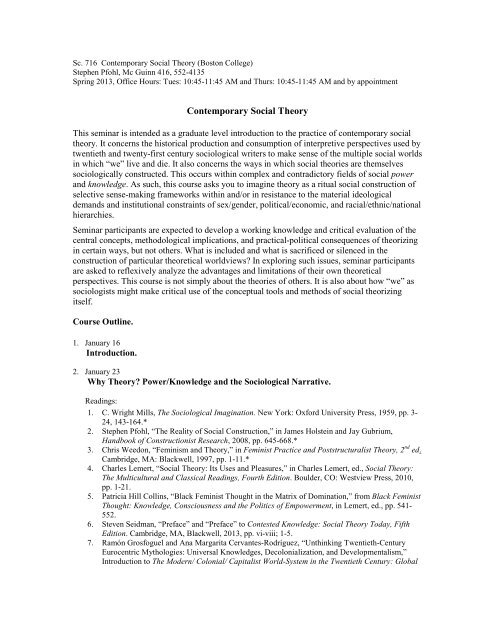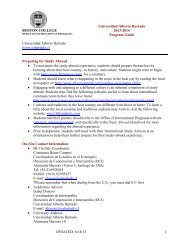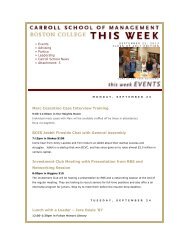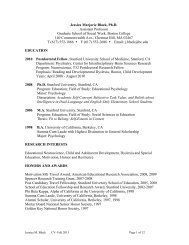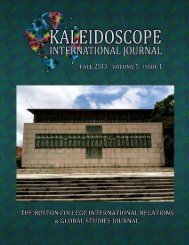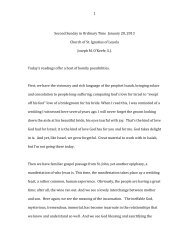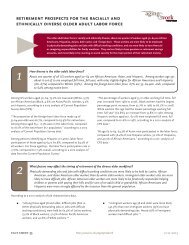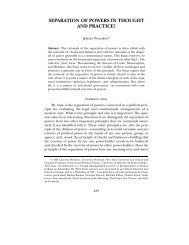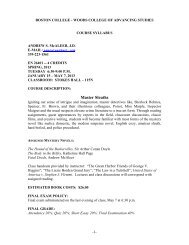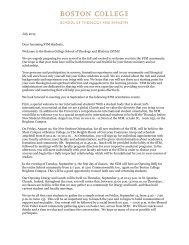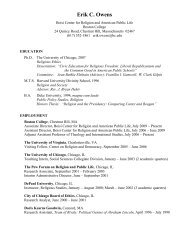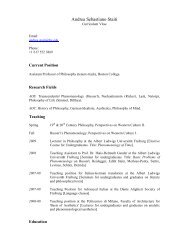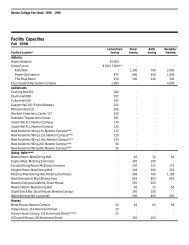Contemporary Social Theory - Boston College
Contemporary Social Theory - Boston College
Contemporary Social Theory - Boston College
Create successful ePaper yourself
Turn your PDF publications into a flip-book with our unique Google optimized e-Paper software.
Sc. 716 <strong>Contemporary</strong> <strong>Social</strong> <strong>Theory</strong> (<strong>Boston</strong> <strong>College</strong>)<br />
Stephen Pfohl, Mc Guinn 416, 552-4135<br />
Spring 2013, Office Hours: Tues: 10:45-11:45 AM and Thurs: 10:45-11:45 AM and by appointment<br />
<strong>Contemporary</strong> <strong>Social</strong> <strong>Theory</strong><br />
This seminar is intended as a graduate level introduction to the practice of contemporary social<br />
theory. It concerns the historical production and consumption of interpretive perspectives used by<br />
twentieth and twenty-first century sociological writers to make sense of the multiple social worlds<br />
in which “we” live and die. It also concerns the ways in which social theories are themselves<br />
sociologically constructed. This occurs within complex and contradictory fields of social power<br />
and knowledge. As such, this course asks you to imagine theory as a ritual social construction of<br />
selective sense-making frameworks within and/or in resistance to the material ideological<br />
demands and institutional constraints of sex/gender, political/economic, and racial/ethnic/national<br />
hierarchies.<br />
Seminar participants are expected to develop a working knowledge and critical evaluation of the<br />
central concepts, methodological implications, and practical-political consequences of theorizing<br />
in certain ways, but not others. What is included and what is sacrificed or silenced in the<br />
construction of particular theoretical worldviews? In exploring such issues, seminar participants<br />
are asked to reflexively analyze the advantages and limitations of their own theoretical<br />
perspectives. This course is not simply about the theories of others. It is also about how “we” as<br />
sociologists might make critical use of the conceptual tools and methods of social theorizing<br />
itself.<br />
Course Outline.<br />
1. January 16<br />
Introduction.<br />
2. January 23<br />
Why <strong>Theory</strong>? Power/Knowledge and the Sociological Narrative.<br />
Readings:<br />
1. C. Wright Mills, The Sociological Imagination. New York: Oxford University Press, 1959, pp. 3-<br />
24, 143-164.*<br />
2. Stephen Pfohl, “The Reality of <strong>Social</strong> Construction,” in James Holstein and Jay Gubrium,<br />
Handbook of Constructionist Research, 2008, pp. 645-668.*<br />
3. Chris Weedon, “Feminism and <strong>Theory</strong>,” in Feminist Practice and Poststructuralist <strong>Theory</strong>, 2 nd ed.<br />
Cambridge, MA: Blackwell, 1997, pp. 1-11.*<br />
4. Charles Lemert, “<strong>Social</strong> <strong>Theory</strong>: Its Uses and Pleasures,” in Charles Lemert, ed., <strong>Social</strong> <strong>Theory</strong>:<br />
The Multicultural and Classical Readings, Fourth Edition. Boulder, CO: Westview Press, 2010,<br />
pp. 1-21.<br />
5. Patricia Hill Collins, “Black Feminist Thought in the Matrix of Domination,” from Black Feminist<br />
Thought: Knowledge, Consciousness and the Politics of Empowerment, in Lemert, ed., pp. 541-<br />
552.<br />
6. Steven Seidman, “Preface” and “Preface” to Contested Knowledge: <strong>Social</strong> <strong>Theory</strong> Today, Fifth<br />
Edition. Cambridge, MA, Blackwell, 2013, pp. vi-viii; 1-5.<br />
7. Ramón Grosfoguel and Ana Margarita Cervantes-Rodríguez, “Unthinking Twentieth-Century<br />
Eurocentric Mythologies: Universal Knowledges, Decolonialization, and Developmentalism,”<br />
Introduction to The Modern/ Colonial/ Capitalist World-System in the Twentieth Century: Global
Processes, Antisystemic Movements and the Geopolitics of Knowledge, Westport, CT: Praeger,<br />
2002, pp. xi-xxix.*<br />
8. Kenneth Allan, “In the Beginning was Modernity,” in <strong>Contemporary</strong> <strong>Social</strong> and Sociological<br />
<strong>Theory</strong>, Third Edition, Thousand Oaks, CA: Pine Forge Press. 2013, pp. xiii- xiv; 1-19.<br />
3. January 30<br />
Functionalism, Cybernetics, and the Middle American Range.<br />
Readings:<br />
1. Talcott Parsons, “The Unit Act of Action Systems,” from The Structure of <strong>Social</strong> Action (1949), in<br />
Lemert, ed., <strong>Social</strong> <strong>Theory</strong>, pp. 213-215.<br />
2. Talcott Parsons, “Action Systems and <strong>Social</strong> Systems,” from The System of Modern Society<br />
(1943) and “Sex Roles in the American kinship Society,“ (1971) in Lemert, ed., <strong>Social</strong> <strong>Theory</strong>,<br />
pp. 301-307 .<br />
3. Talcott Parsons, Selections from Talcott Parsons: On Institutions and <strong>Social</strong> Evolution, Leon H.<br />
Mayhew, ed., University of Chicago Press, 1982, “Hierarchy of Control,” 157-172, “Evolutionary<br />
Universalism,” pp. 296-326.*<br />
4. Robert K. Merton, “Manifest and Latent Functions,” pp. 73-138 in <strong>Social</strong> <strong>Theory</strong> and <strong>Social</strong><br />
Structure, New York: Free Press, 1968.*<br />
5. Robert K. Merton, “<strong>Social</strong> Structure and Anomie,” in Lemert, ed., <strong>Social</strong> <strong>Theory</strong>, pp. 229-242.<br />
6. Steven Seidmen, Chapter 5, “The Grand <strong>Theory</strong> of Talcott Parsons,” in Contested Knowledge, pp.<br />
70-79.<br />
7. Kenneth Allan, Chapter 2, “Defining Moments in the Twentieth-Century <strong>Theory</strong>: Talcott Parsons<br />
and the Frankfurt School,” in <strong>Contemporary</strong> <strong>Social</strong> and Sociological <strong>Theory</strong>, Third Edition, pp.<br />
20-32.<br />
8. Nicolas Luhmann, “The Concept of Society,” Thesis Eleven, No. 31 (1992), pp. 67-80.*<br />
9. Johanna Macy, “General Systems <strong>Theory</strong>,“ in Mutual Causality in Buddhism and General Systems<br />
<strong>Theory</strong>, Albany: State University of New York Press, 1991, pp. 69-89.*<br />
4. Feb. 6<br />
<strong>Social</strong> and Behavioral Exchange: Control, Power and Structure.<br />
Readings:<br />
1. George Homans, “The Sociological Relevance of Behaviorism,” in R. L. Burgess and D. Bushell,<br />
Jr., eds., Behavioral Sociology. New York: Columbia University Press, 1969, pp. 1-24.*<br />
2. Peter Blau, Exchange and Power in <strong>Social</strong> Life. New York: John Wiley, 1964, pp. 14-17, 100-<br />
112.*<br />
3. Richard M. Emerson, “Operant Psychology and Exchange <strong>Theory</strong>,” in R.L. Burgess and D.<br />
Bushell, Jr., eds., Behavioral Sociology, pp. 379-405.*<br />
4. Nancy C.M. Hartsock, “Exchange <strong>Theory</strong>: Critique from a Feminist Standpoint,” in Current<br />
Perspectives in <strong>Social</strong> <strong>Theory</strong>, Vol. 6, New York: Jai Press, 1985, pp. 57-70.*<br />
5. Audre Lordre, “The Master’s Tools Will Never Dismantle the Master’s House,” in Lemert, ed.,<br />
<strong>Social</strong> <strong>Theory</strong>, pp. 449-451.<br />
6. Georges Bataille, “The Notion of Expenditure,” in Visions of Excess: Selected Writings, 1937-<br />
1939, trans. Alan Stoekel. Minneaoplis: University of Minnesota Press, 1985, pp. 116-129.*<br />
7. Stephen Pfohl, “Sacrificial Doublings and the Gift of Excess: Durkheim, Mauss, and the “Origins”<br />
of Poststructuralist Thought,” Epoche: The University of California Journal for the Study of<br />
Religions, Vol. XXI, No. 2 (Winter 1998), pp. 15-29.*<br />
8. Michael Richardson, “Expenditure and the General Economy,” in Georges Bataille. New York:<br />
Routledge, 1994, pp. 67-96.*<br />
9. Steven Seidmen, “The Scientific <strong>Theory</strong> of Randall Collins and Peter Blau, ” in Contested<br />
Knowledge, pp. 86-96.<br />
10. Kenneth Allan, Chapter 6, “<strong>Social</strong> Exchanges: George Homans, Peter Blau, and Randall Collins,”<br />
in <strong>Contemporary</strong> <strong>Social</strong> and Sociological <strong>Theory</strong>, Third Edition, pp. 101-135.
5. February 13<br />
Theories of Conflict, Power, and Hauntings.<br />
Readings:<br />
1. Steven Seidmen, Chapter 15, “Critical Race <strong>Theory</strong>/ White Studies, ” in Contested Knowledge,<br />
pp. 226-238.<br />
2. Lewis Coser, The Functions of <strong>Social</strong> Conflict. Glencoe, Illinois: The Free Press, 1956, pp. 151-<br />
56.*<br />
3. Randall Collins, “A <strong>Theory</strong> of Stratification,” pp. 49-61 in Conflict Sociology. New York:<br />
Academic Press, 1975.*<br />
4. Margaret M. Poloma, “Reflexive Sociology: A Critical Study of Society” (on Alvin Gouldner), pp.<br />
256-269 in Margaret M. Poloma, <strong>Contemporary</strong> Sociological <strong>Theory</strong>. New York: Macmillan,<br />
1979.*<br />
5. W.E.B. Dubois, “Double Consciousness and the Veil,” and “Black Reconstruction and the Racial<br />
Wage,” in Lemert, ed., <strong>Social</strong> <strong>Theory</strong>, pp. 167-172; 242-245.<br />
6. Charlotte Perkins Gilman, “The Yellow Wallpaper,” and “Women and Economics” in Lemert, ed.,<br />
<strong>Social</strong> <strong>Theory</strong>, pp. 172-178.<br />
7. Dorothy Smith, “Knowing a Society from Within: a Woman’s Standpoint,” from The Conceptual<br />
Practices of Power, in Lemert, ed., <strong>Social</strong> <strong>Theory</strong>, pp. 394-399.<br />
8. Eduardo Bonilla-Silva, “What is Racism?” and “Conclusion: New Racism, New <strong>Theory</strong>, and New<br />
Struggle,” Chapter 7 in White Supremacy and Racism in the Post-Civil Rights Era. Boulder, CO:<br />
Lynne Rienner Publishers, 2001, pp. 193-207.*<br />
9. Avery Gordon, “her shape and his hand,” in Ghostly Matters: Haunting and the Sociological<br />
Imagination. Minneapolis: University of Minnesota Press, 1997, pp. 3-28.<br />
10. Kenneth Allan, Chapter 7, “Structures of Racial and Gender Inequality,” in <strong>Contemporary</strong> <strong>Social</strong><br />
and <strong>Social</strong> <strong>Theory</strong>, Third Edition, pp. 140-175.<br />
11. Alvin Gouldner, “Toward a Reflexive Sociology,” in Lemert, ed., <strong>Social</strong> <strong>Theory</strong>, pp. 431-436.<br />
6. February 20<br />
Processes and Forms of Symbolic Interaction: the Self and its Others.<br />
Readings:<br />
1. George Herbert Mead, “The Self, the I, and the Me,” from Mind, Self and Society. Chicago:<br />
University of Chicago, (1934), in Lemert, ed., <strong>Social</strong> <strong>Theory</strong>, pp. 224-229.<br />
2. Herbert Blumer, “Society as Symbolic Interaction,” pp. 145-154 in J.G. Manis and B.N. Meltzer,<br />
Symbolic Interaction, 2 nd ed. <strong>Boston</strong>: Allyn and Bacon, 1972.*<br />
3. Erving Goffman, “On Face-Work,” in Lemert, ed., <strong>Social</strong> <strong>Theory</strong>, pp. 338-342.<br />
4. Kenneth Allan, Chapter 7, “The Language of the Self: Herbert Blumer,” and Chapter 4, “Imaging<br />
the Self: Erving Goffman,” in <strong>Contemporary</strong> <strong>Social</strong> and <strong>Social</strong> <strong>Theory</strong>, Third Edition, pp. 36-78.<br />
5. William James, “The Self and Its Selves,” in Lemert, ed., <strong>Social</strong> <strong>Theory</strong>, pp. 161-166.<br />
6. Charles Horton Cooley, “The Looking Glass Self,” in Lemert, ed., <strong>Social</strong> <strong>Theory</strong>, pp. 188-189.<br />
7. Aime Cesare, “Between Colonizer and Colonized,” Lemert, ed., <strong>Social</strong> <strong>Theory</strong>, pp. 348-350.<br />
8 C. Wright Mills, White Collar. New York: Oxford University Press, 1951, pp. 324-354.*<br />
9. C. Wright Mills, “Situated Actions and Vocabularies of Motive,” pp. 439-452 in Power, Politics<br />
and People. New York: Oxford University Press, 1967.*<br />
10. Cornel West, “C. Wright Mills and W.E.B. Du Bois,” in The American Evasion of Philosophy: a<br />
Geneaology of Pragmatism, Madison: University of Wisconsin, 1989, pp. 124-150.*<br />
11. Cornel West, “Beyond Multiculturalism and Eurocentrism,” in Prophetic Thought in Postmodern<br />
Times. Monroe, Maine: Common Courage Press, 1993, pp. 3-30.*<br />
12. Steven Seidmen, “The Moral Sociology of C.W. Mills and Robert Bellah,” in Contested<br />
Knowledge, pp. 97-112.<br />
13. Simone de Beauvoir, “Woman as Other,” in Lemert, ed., <strong>Social</strong> <strong>Theory</strong>, pp. 345-347.<br />
14. Johanna Macy, “Self as Process,“ in Mutual Causality in Buddhism and Genreal Systems <strong>Theory</strong>,<br />
Albany: State University of New York Press, 1991, pp. 108-116.*
7. February 27<br />
Phenomenology, Ethnomethodology, Interpretive Sociology.<br />
Readings:<br />
1. Alfred Schutz, “Commonsense and Scientific Interpretation of Human Action,” Philosophy and<br />
Phenomenological Research 14, 1 (September 1953), pp. 1-37.*<br />
2. Peter Berger and Thomas Luckman, The <strong>Social</strong> Construction of Reality (1966), in Lemert, ed.,<br />
<strong>Social</strong> <strong>Theory</strong>, pp. 389-394.<br />
3. Harold Garfinkel, “Reflexive Properties of Practical Sociology,” in Lemert, ed., <strong>Social</strong> <strong>Theory</strong>, pp.<br />
439-443.<br />
5. Betty Friedan, “The Problem That Has No Name,” in Lemert, ed., <strong>Social</strong> <strong>Theory</strong>, pp. 361-364.<br />
6. Jurgen Habermas, “Emancipatory Knowledge,” from Knowledge and Human Interests; and<br />
“<strong>Social</strong> Analysis and Communicative Competence,” in Lemert, ed., <strong>Social</strong> <strong>Theory</strong>, pp. 386-389.<br />
7. Trinh T. Minh-ha, “Infinite Layers/Third World?” in Lemert, ed., <strong>Social</strong> <strong>Theory</strong>, pp. 531-536.<br />
8. Steven Seidman, Chapter 5, “The Grand <strong>Theory</strong> of … Peter Berger and Thomas Luckman, ” in<br />
Contested Knowledge, pp. 80-85.<br />
9. Kenneth Allan, Chapter 5, “Achieving <strong>Social</strong> Order: Harold Garfinkel,” in <strong>Contemporary</strong> <strong>Social</strong><br />
and Sociological <strong>Theory</strong>, Third Edition, pp. 27-47, 49-71.<br />
10. Stephen Pfohl, “<strong>Social</strong> Role Analysis: The Ethnomethodological Critique,” Sociology and <strong>Social</strong><br />
Research, 59, 3 (April 1975) pp. 243-265.*<br />
11. Hugh Mehan and Huston Wood, “The Morality of Ethnomethodology,” The Reality of<br />
Ethnomethodology. New York: John Wiley and Sons, 1975, pp. 205-224.*<br />
<strong>Boston</strong> <strong>College</strong> Spring Break<br />
8. March 13<br />
Structuring Structures: Fields, Habitus, Bio-media, and Bodies<br />
(Seminar will meet from 3-4:30 PM to enable attendance at Avery Gordon’s lecture as<br />
part of the Sociology Department’s Visiting Distinguished Scholars Series. No formal<br />
discussion leaders for this week.)<br />
Readings:<br />
1. Patricia Clough, “The Affective Turn: Political Economy, Biomedia, and Bodies,” in Melissa<br />
Gregg and Gregory J. Seigworth, eds., The Affect Reader, Durham, NC: Duke University Press,<br />
2010, pp. 206-228.*<br />
2. Kenneth Allen, Chapter 8, “Structuring Class: Pierre Bourdieu,” in <strong>Contemporary</strong> <strong>Social</strong> and<br />
Sociological <strong>Theory</strong>, Third Edition, pp. 176-196.<br />
3. Steven Seidman, Chapter 6, “The Critical Sociology of Anthony Giddens and Pierre Bourdieu, ”<br />
in Contested Knowledge, pp. 140-151.<br />
4. Anthony Giddens, “Elements in the <strong>Theory</strong> of Structuration,” in The Constitution of Society.<br />
Berkeley: University of California Press, 1984, pp. 1-40.*<br />
5. Pierre Bourdieu, “Structures, Habitus, Practices,” in Lemert, ed., <strong>Social</strong> <strong>Theory</strong>, pp. 444-449.<br />
6. Kenneth Allan, Chapter 14, “Runaway Modernity: Anthony Giddens,” in <strong>Contemporary</strong> <strong>Social</strong><br />
and Sociological <strong>Theory</strong>, Third Edition, pp. 309-334.<br />
9. March 20<br />
Traces of Marxism: <strong>Theory</strong> and Practice.<br />
Readings:<br />
1. Stuart Hall, “Gramsci’s Relevance for the Study of Race and Ethnicity,” in David Morley and<br />
Kuan-Hsing Chen, eds., Stuart Hall: Critical Dialogues in Cultural Studies. New York:<br />
Routledge, 1996, pp. 411-440.*
2. Raymond Williams, Marxism and Literature. London: Oxford University Press, pp. 75-82, 95-<br />
100, 108-114, 122-135.*<br />
3. Steven Seidman, Chapter 8, “The Critical <strong>Theory</strong> of Jürgen Habermas, ” in Contested<br />
Knowledges, pp. 119-131.<br />
4. Patricia Ticineto Clough, “From Gynocentyrism to Standpoint Epistemologies,” in Feminist<br />
Thought, pp. 62-86.*<br />
5. Antonio Gramsci, “Intellectuals and Hegemony,” in Lemert, ed., <strong>Social</strong> <strong>Theory</strong>, pp. 263-265.<br />
6. Georg Lukacs, “The Irrational Chasm Between Subject and Object,” from History and Class<br />
Consciousness, in Lemert, ed., <strong>Social</strong> <strong>Theory</strong>, pp. 202-204.<br />
7. Arthur Kroker, “Baudrillard’s Marx,” in Arthur Kroker and David Cook, The Postmodern Scene.<br />
New York: St. Martins Press, 1987, pp. 170-188.*<br />
8. Antonio Gramsci, “Historicity of the Philosophy of Praxis, “The Hegemony of Western Culture,”<br />
and “Critical Notes on an Attempt at Popular Sociology,” in Selections from Prison Notebooks,<br />
trans. Quinton Hoare and Geoffrey Nowll Smith. London: Lawrence and Wishart, 1971, pp. 404-<br />
407; 416-430.*<br />
9. Immanuel Wallerstein, “The Modern World-System,” in Lemert, ed., <strong>Social</strong> <strong>Theory</strong>, pp. 390-397.<br />
10. Kenneth Allen, Chapter 10, “World System <strong>Theory</strong>: Immanuel Wallerstein,” in <strong>Contemporary</strong><br />
<strong>Social</strong> and Sociological <strong>Theory</strong>, Third Edition, pp. 224-245.<br />
11. Herbert Marcuse, “Repressive Desublimation,” in Lemert, ed., <strong>Social</strong> <strong>Theory</strong>, pp. 427-430.<br />
12. Robin D.G. Kelley, “Foreward” to Cedric J. Robinson, Black Marxism: The Making of the Black<br />
Radical Tradition. Chapel Hill: University of North carolina Press, 2000, pp. xi-xxxiii.*<br />
10. March 27<br />
<strong>Social</strong> Psychoanalysis: Ritual Structures and the Unconscious.<br />
Readings:<br />
1. Sigmund Freud, “The Psychical Apparatus and the <strong>Theory</strong> of Instincts,” “Dream-Work and<br />
Interpretation,” “Remembering, Repeating, and Working Through,” “The Return of the Repressed<br />
in <strong>Social</strong> Life, ” “Civilization and the Individual,” in Lemert, ed., <strong>Social</strong> <strong>Theory</strong>, pp. 129-133;<br />
133-137; 141-145; 145-149; 149-152.<br />
2. Jacques Lacan, “The Eccentric Self and the Discourse of the Other,” in Lemert, ed., <strong>Social</strong> <strong>Theory</strong>,<br />
pp. 342-344.<br />
3. Teresa Brennan, History After Lacan. New York: Routledge, 1993, pp. 1-25.*<br />
4. Paul Smith, “The Unconscious,” in Discerning the Subject.* Minneapolis: University of<br />
Minnesota Press, 1988, pp. 70-82.*<br />
5. Avery Gordon, “distractions,” in Ghostly Matters, pp. 31-60.<br />
6. Nancy Chodorow, “Gender Personality and the Reproduction of Mothering,” in Lemert, ed.,<br />
<strong>Social</strong> <strong>Theory</strong>, pp. 408-412.<br />
7. Jane Gallop, Reading Lacan, Ithaca: Cornell University Press, 1985, pp. 13-30.*<br />
8. Elizabeth Grosz, Jacques Lacan: A Feminist Introduction. Routledge, 1990, pp. 1-23.*<br />
9. Louis Althusser, “Ideology and Ideological State Apparatuses,” in Lemert, ed., <strong>Social</strong> <strong>Theory</strong>, pp.<br />
321-324.<br />
10. Slavoj Zizek, “Cynicism as a Form of Ideology,” in Lemert, ed., <strong>Social</strong> <strong>Theory</strong>, pp. 668-671.<br />
11. Anthony Elliot, Chapter 2, "Marcuse’s Freudian Revolution,” “Psychoanalysis and<br />
Postcolonialism,” and “Poststructuralist Anxiety: Subjects of Desire," in Psychoanalytic <strong>Theory</strong>:<br />
An Introduction, Second Edition, Durham, NC: Duke University Press, 2002, pp. 51-60; 99-124..*<br />
11. April 3<br />
Subjects of Power and Knowledge: Genealogy, History, Discourse.<br />
Readings:<br />
1. Michel Foucault, “Nietzsche, Genealogy, History” in Language, Counter-Memory, Practice,<br />
edited by Donald F. Bouchard. Ithaca: Cornell University Press, 1977.*<br />
2. Michel Foucault, “Power as Knowledge,” in Lemert, ed., <strong>Social</strong> <strong>Theory</strong>, pp. 473-479.
3. Michel Foucualt, “Biopolitics and the Caceral Society, ” in Lemert, ed., <strong>Social</strong> <strong>Theory</strong>, pp. 417-<br />
421.<br />
4. Nancy Harstock, “Foucault on Power: A <strong>Theory</strong> for Women,” in Lemert, ed., <strong>Social</strong> <strong>Theory</strong>, pp.<br />
495-500.<br />
5. Jackie Orr, “Panic Diary: (re)constructing a partial poetics of disease,” in James A. Holstein and<br />
Gale Miller (eds.), Reconsidering <strong>Social</strong> Constructionism. New York: Aldine de Gruyter, 1993,<br />
pp. 441-482.*<br />
6. Stephen Pfohl and Avery Gordon, "Criminological Displacements," <strong>Social</strong> Problems, Vol. 33, 6<br />
(October/December 1986), pp. S94-S113. (Video-essay, 1985, to be shown in class.)*<br />
7. Steven Seidmen, Chapter 12, “Michel Foucault’s Disciplinary Society,”in Contested Knowledge,<br />
pp. 175-187.<br />
8. Chris Weedon, “Discourse, Power and Resistance”, in Feminist <strong>Theory</strong> and Poststructuralist<br />
Practice, pp. 104-131.*<br />
9. Kenneth Allen, Chapter 9, “Structures of Power: Michel Foucault,” in <strong>Contemporary</strong> <strong>Social</strong> and<br />
Sociological <strong>Theory</strong>, Third Edition, pp. 197-223.<br />
11. April 10<br />
Structuralism, Semiotics, Cultural Critique.<br />
Readings:<br />
1. Emile Durkheim and Marcel Mauss, “Primitive Classifications and <strong>Social</strong> Knowledge,” from<br />
Primitive Classification (1903), in Lemert, ed., <strong>Social</strong> <strong>Theory</strong>, pp. 89-94.<br />
2. Emile Durkheim, “The Cultural Logic of Collective Representations,” from The Elementary<br />
Forms of Religious Life (1912), in Lemert, ed., <strong>Social</strong> <strong>Theory</strong>, pp. 94-103.<br />
3. Kenneth Allen, “Introduction to Section IV: Identity Politics,” and Chapter 16, “Race Matters,” in<br />
<strong>Contemporary</strong> <strong>Social</strong> and Sociological <strong>Theory</strong>, pp. 353-382<br />
4. Ferdinand de Saussure, “Arbitrary <strong>Social</strong> Values and the Linguistic Sign,” in Lemert (ed.), pp.<br />
151-160.<br />
5. Rosiland Coward and John Ellis, Language and Materialism. <strong>Boston</strong>: Routledge and Kegan Paul,<br />
1977, pp. 1-24.*<br />
6. Stuart Hall, “Cultural Studies and the Centre: Some Problematics and Problems,” in Stuart Hall,<br />
Dorothy Hobson, Andrew Lowe, and Paul Willis, eds., Culture, Media, Language. London:<br />
Hutchinson, 1981, pp. 15-47.*<br />
7. Dick Hebdige, “From Culture to Hegemony,” in Subculture: The Meaning of Style. New York:<br />
Methuen, 1979, pp. 1-19.*<br />
8. Steven Seidman, Chapter 9, “Stuart Hall and British Cultural Studies,“ in Contested Knowledge,<br />
pp. 132-139.<br />
9. Gayatri Chakrovorty Spivak, “Can the Sualtern Speak?” in Lemert, ed., <strong>Social</strong> <strong>Theory</strong>, pp. 536-<br />
540.<br />
10. Ernesto LaClau and Chantal Mouffe, “Radical Democracy: Alternative for the New Left,” in<br />
Lemert, ed., <strong>Social</strong> <strong>Theory</strong>, pp. 492-495.<br />
11. Ann Swidler, “Culture in Action: Symbols and Strategies,” American Sociological Review, Vol.<br />
51, No. 2 (April 1986), pp. 273-286.*<br />
12. April 17<br />
Poststructuralism and Sociological Deconstruction.<br />
Readings<br />
1. James Clifford, “Introduction: Partial Truths,” in James Clifford and George E. Marcus, Writing<br />
Culture: The Poetics and Politics of Ethnography. Berkeley, CA: University of California Press,<br />
1986, pp. 1-26.*<br />
2. Elizabeth Grosz, “Nietzsche and Choreography,” in Volatile Bodies: Towards a Corporeal<br />
Feminism. Bloomington: Indiana University Press, 1994, pp. 115-137.*
3. Stephen Pfohl, “Revenge of the Parasites: Feeding Off the Ruins of Sociological<br />
(De)construction,” in James A. Holstein and Gale Miller (eds.), Reconsidering <strong>Social</strong><br />
Constructionism. New York: Aldine de Gruyter, 1993, pp. 403-440.*<br />
4. Gayatri Chakravorty Spivak, “Strategies of Vigilance” an interview conducted by Angela<br />
McRobbie. Block, Vol 10 (1985), pp. 5-9.*<br />
5. Cornel West, “The New Cultural Politics of Difference,” in Lemert (ed.), pp. 511-521.<br />
6. Henry Louis Gates, Jr., “Race as the Trope of the World,” in Lemert (ed.), pp. 521-526.<br />
7. Jacques Derrida, “The Decentering Event in <strong>Social</strong> Thought,” in Lemert (ed.), pp. 413-417.<br />
8. Patricia Ticineto Clough, “Reformulating a Feminist Post-colonial Criticsm,” in Femininst<br />
Thought, pp. 114-141.*<br />
9. Steven Seidman, “The Postmodern World of Jacques Derrida, Jean Francois Lyotard,” in<br />
Contested Knowledge, pp. 159-170.<br />
10. Zine Magubane, “The Metaphors of Race Matter(s): The Figurative Uses and Abuses of<br />
Blackness,” in Bringing the Empire Home: Race, Class, and Gender in Britain and Colonial South<br />
Africa. Chicago: University of Chicago Press, 2004, pp. 1-13.*<br />
11. Patricia Ticineto Clough, “Teletechnology and the Unbundling of <strong>Social</strong> Structures,” in Lemert,<br />
ed., <strong>Social</strong> <strong>Theory</strong>, pp. 661-663.<br />
12. Gilles Deleuze and Felix Guattari, “The Rhizome/ A Thousand Plateaus,” in Lemert, ed., <strong>Social</strong><br />
<strong>Theory</strong>, pp. 671-673.<br />
13. Michael Ryan, Marxism and Deconstruction. Baltimore: Johns Hopkins University Press, 1982, pp.<br />
213-221.*<br />
13. April 24<br />
Feminist Perspectives and Sex/Gendered Epistemologies.<br />
Readings:<br />
1. Kenneth Allen, Chapter 16, “Text, Power, and Women: Dorothy Smith,” in <strong>Contemporary</strong> <strong>Social</strong><br />
and Sociological <strong>Theory</strong>, Third Edition, pp. 362-379.<br />
2. bell hooks, “Black Women: Shaping Feminist <strong>Theory</strong>,” in Feminist <strong>Theory</strong>: From Margin to<br />
Center. <strong>Boston</strong>: South End Press, 1984, pp. 1-15.*<br />
3. Margaret Whitford, “Luce Irigaray and the Female Imaginary: Speaking as a Woman,” Radical<br />
Philosophy. 43 (Summer 1986), pp. 3-8.*<br />
4. Elizabeth Grosz, “Sexed Bodies,” in Volatile Bodies: Towards a Corporeal Feminism.<br />
Bloomington: Indian University Press, 1994, pp. 187-210.*<br />
5. Judith Butler, “Imitation and Gender Insubordination,” in Lemert, ed., <strong>Social</strong> <strong>Theory</strong>, pp. 562-573.<br />
6. Kenneth Allen, Chapter 17, “Exposing Sex: Judith Butler,” in <strong>Contemporary</strong> <strong>Social</strong> and<br />
Sociological <strong>Theory</strong>, pp. 380-400.<br />
7. Gloria Anzaldua, “The New Mestiza,” in Lemert, ed., <strong>Social</strong> <strong>Theory</strong>, pp. 552-558.<br />
8. Jeffrey Weeks, “Sexual Identification is a Strange Thing,” in Lemert, ed., <strong>Social</strong> <strong>Theory</strong>, pp. 558-<br />
562.<br />
9. Steven Seidmen, “Revisions and Revolts,” Chapter 14, “Feminist <strong>Theory</strong>/ Masculinity Studies, ”<br />
and Chapter 16, “Lesbian, Gay and Queer <strong>Theory</strong>/ Heterosexual Studies, ” pp. 203-225, 239-253.<br />
10. Donna Haraway, “Situated Knowledges: the Science Question in Feminism and the Privilege of<br />
Partial Perspectives,” in Simians, Cyborgs, and Women. New York: Routledge, 1991, pp. 183-<br />
201.*<br />
11. Mary Daly, Beyond God the Father: Toward a Philosophy of Women’s Liberation. <strong>Boston</strong>:<br />
Beacon Press, pp. 1-43.*<br />
12. Saskia Sassen, “Toward a Feminist Analysis of the Global Economy,” in Lemert, ed., <strong>Social</strong><br />
<strong>Theory</strong>, pp. 624-629.<br />
13. Raewyn Connell, “Masculinities and Globalization,” in Lemert, ed., <strong>Social</strong> <strong>Theory</strong>, pp. 666-668<br />
14. May 1<br />
Postmodernity, Postmodernism, and the Coloniality of Power.
Readings:<br />
1. Donna Haraway, “The Cyborg Manifesto and Fractured Identities,” in Lemert, ed., <strong>Social</strong> <strong>Theory</strong>,<br />
pp. 522-526.<br />
2. Steven Seidmen, “The Postmodern World of Jean-Francois Lyotard, Jean Baudrillard, ” “Zygmunt<br />
Bauman’s Sociology of Postmodernism,“ Chapter 17, “Colonial Discourse Studies,” and<br />
“Epilogue: <strong>Social</strong> <strong>Theory</strong> Today,” in Contested Knowledge, pp. 167-174, 188-196, 261-282.<br />
3. Jean Baudrillard, “Simulacra and Simulations: Disneyland,” in Lemert, ed., <strong>Social</strong> <strong>Theory</strong>, pp.<br />
479-484.<br />
4. Avery Gordon, “there are crossroads,” in Ghostly Matters, pp. 193-208.<br />
5. Ramón Grosfoguel, “Geopolitics of Knowledge and the Coloniality of Power,” in Stephen Pfohl,<br />
Aimee Van Wagenen, Patricia Arend, Abigail Brooks, and Denise Leckenby, eds., Culture, Power<br />
and History: Studies in Critical Sociology, Leiden: Brill, 2006, pp. 479-506.*<br />
6. Manuel Castells, “The Global Network,” in Lemert, ed., <strong>Social</strong> <strong>Theory</strong>, pp. 620-624.<br />
7. bell hooks, “Postmodern Blackness,” in Yearnings. <strong>Boston</strong>: South End Press, 1990, pp. 23-31.*<br />
8. Cornel West, “Black Culture and Postmodernism,” in Barbara Kruger and Phil Marini, eds.,<br />
Remaking History, Seattle, WA: Bay Press, 1990, pp. 87-96.*<br />
9. Stephen Pfohl, “Twilight of the Parasites: Ultramodern Capital and the New World Order,” <strong>Social</strong><br />
Problems, Vol. 40, No. 2, (May, 1993), pp. 125-151.*<br />
10. Zygmunt Bauman, “A Sociological <strong>Theory</strong> of Postmodernity,” in Intimations of Postmodernity.<br />
New York: Routledge, 1992, pp. 187-204.*<br />
11. Cynthia Kaufman, “Postmodernism and Praxis: Weaving Radical <strong>Theory</strong>,” <strong>Social</strong>ist Review, Vol.<br />
24, No. 3 (1994), pp. 57-80.*<br />
12. Kenneth Allen, “Conclusion: Post Thinking,” in <strong>Contemporary</strong> <strong>Social</strong> and Sociological <strong>Theory</strong>,<br />
Third Edition, pp. 400-410.<br />
13. Stuart Hall, “The Global, the Local, and the Return of Ethnicity, ” in Lemert, ed., <strong>Social</strong> <strong>Theory</strong>,<br />
pp. 609-615.<br />
14. Amartya Sen, “Asian Values and the West’s Claim to Uniqueness,” in Lemert, ed., <strong>Social</strong> <strong>Theory</strong>,<br />
pp. 629-636.<br />
Course Requirements:<br />
1. This a graduate-level seminar. All participants are expected to engage rigorously with all<br />
assigned readings and actively contribute to course discussion. Participants are also required<br />
to rotate roles as seminar discussion leaders on three seaprate occasions (two leaders per<br />
week). Discussion leaders are expected to meet before class sessions to discuss issues<br />
pertinent to a given week’s themes and to prepare brief “discussion-opening” remarks and<br />
questions. (10%)<br />
2. Participants enrolled for credit are expected to complete 2 short (5 double-spaced page)<br />
analytic reaction papers. Each short paper is to address issues of importance in a given<br />
week’s seminar themes and readings. These short essays may reflect on the analytic<br />
advantages and problems associated with a given perspective and/ or apply a theoretical<br />
perspective to interpret or explain a particular social phenomenon. After receiving feedback<br />
from the instructor, one of these papers is to be revised, disseminated and presented to the<br />
seminar. The first essay is due no later than March 19 th ; the second is due no later than May<br />
1 st (50%)<br />
3. Participants enrolled for credit are also to complete one 15 page professional conference-style<br />
“theoretical” essay. This essay is to display a critical knowledge of at least two different<br />
contemporary theoretical perspectives addressed in the seminar. Essays are to demonstrate an<br />
ability to use selected theoretical frameworks to “make sense” of and/or critique a particular<br />
sociological concern or problem. Short in-class presentations on seminar papers-in-progress
will be made during the month of April. Final papers are due no later than Wednesday, May<br />
8 th , 5 PM. (40%)


